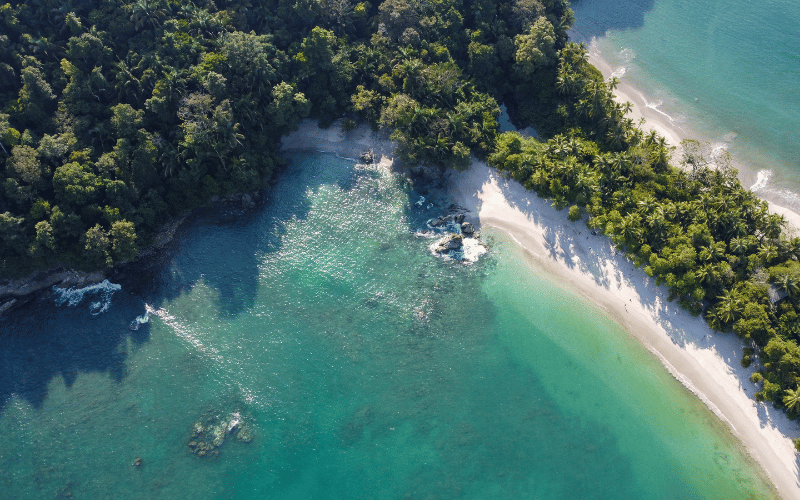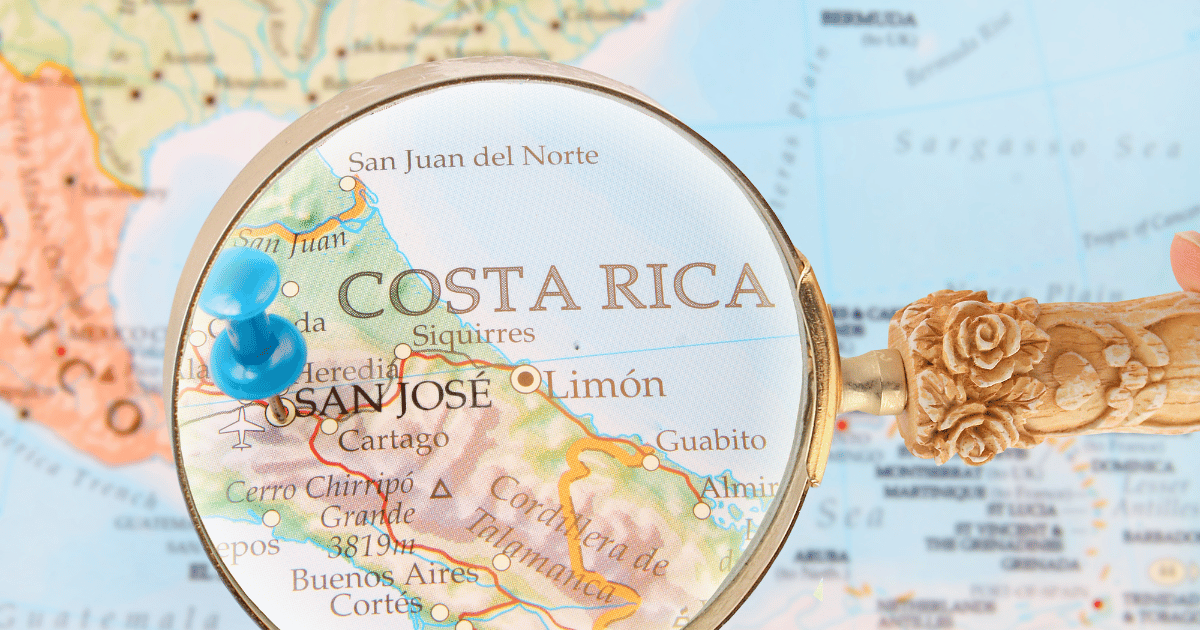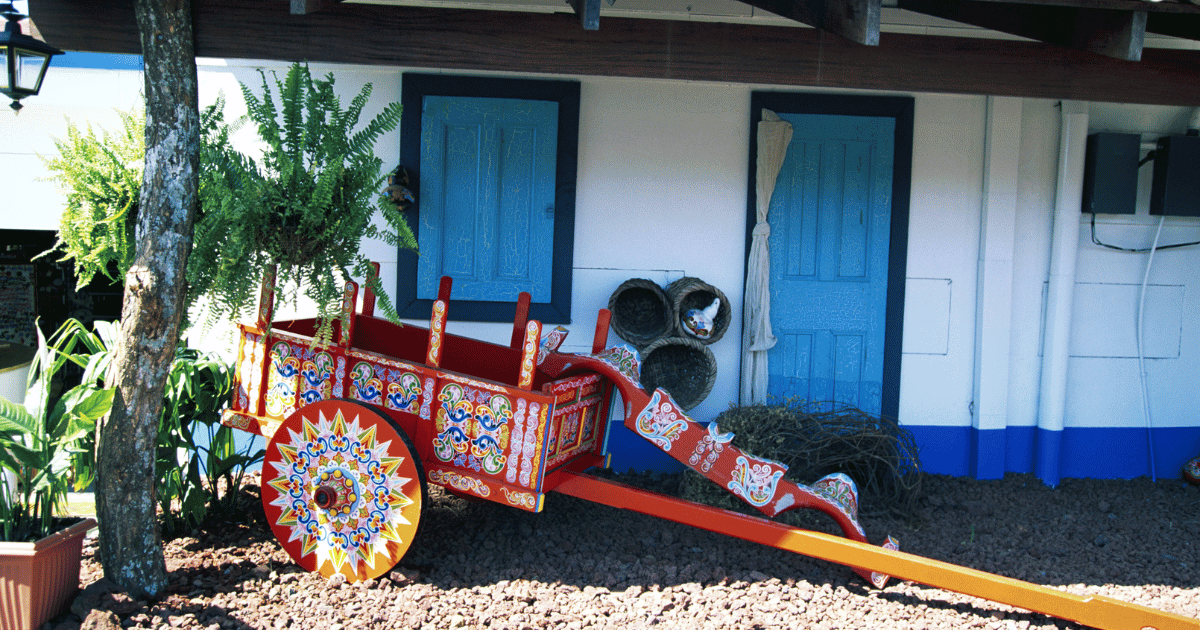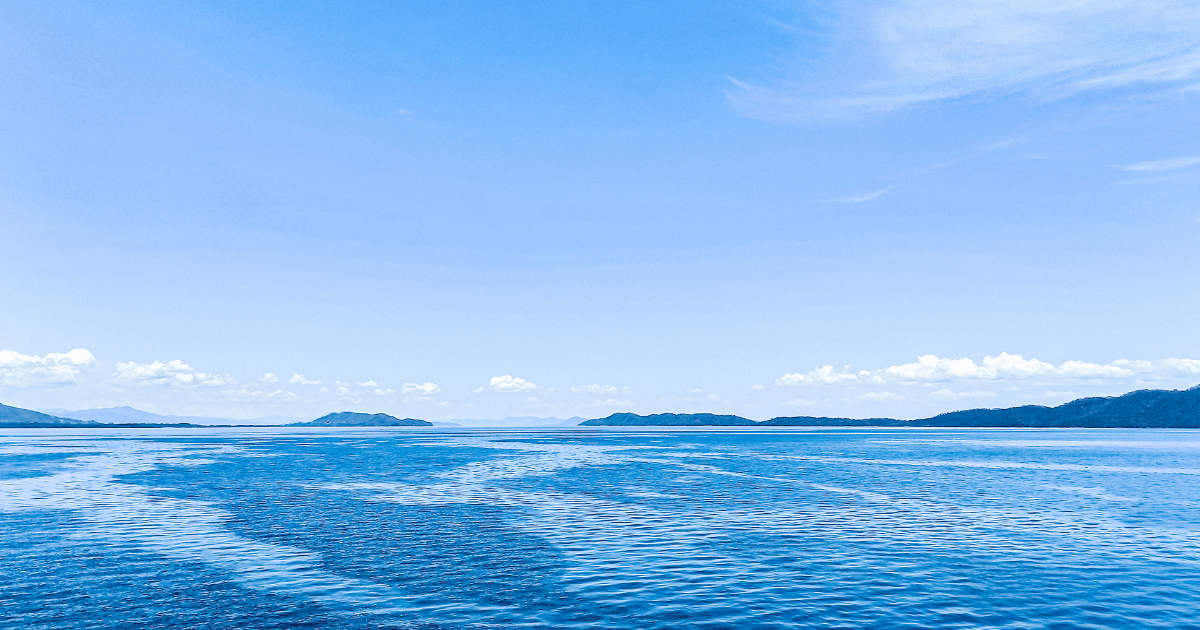
COSTA RICA
Explore Costa Rica’s rich coastline with our expert beach guides! This blog is your go-to resource for exploring the diverse coastal landscapes, wildlife, and hidden beach gems of this tropical paradise. Discover top snorkeling spots, eco-friendly beach resorts, and tips for a perfect day by the sea. We share our firsthand experiences and insights, guiding you to the best beach adventures Costa Rica has to offer.
Quick Facts About Costa Rica
| CATEGORY | FACTS |
|---|---|
| Location | Central America, bordered by Nicaragua to the north, Panama to the south, and the Caribbean Sea to the east, and the Pacific Ocean to the west. |
| Borders | Nicaragua, Panama. |
| Climate | Tropical and subtropical; dry season (December to April), rainy season (May to November). |
| Population | Approximately 5.1 million (2023). |
| Official Language | Spanish. |
| Currency | Costa Rican Colón (CRC). |
| Capital | San José. |
| Major Industries | Tourism, agriculture (bananas, coffee, pineapples), electronics, medical equipment, and ecotourism. |
| Religion | Predominantly Roman Catholic, with a growing presence of Protestantism and other religions. |
| Time Zone | GMT-6 (Central Standard Time). |
| National Symbols | The Yigüirro (clay-colored thrush), the Guanacaste Tree, the Marimba, and the Blue, White, and Red Flag. |
Geography and Environment

Major Physical Features
Costa Rica offers a variety of landscapes that you can explore. You’ll find dense rainforests, misty cloud forests, and volcanic mountains. The Cordillera Central and Cordillera de Talamanca mountain ranges are home to active volcanoes like Arenal and Poás. If you’re more of a beach person, Costa Rica’s coasts have sandy beaches along both the Pacific Ocean and the Caribbean Sea. The Osa and Nicoya Peninsulas are famous for their rich biodiversity and untouched beaches, perfect for adventure and relaxation.
Seasonal Variations
Costa Rica’s tropical climate brings two main seasons. The dry season, from December to April, is sunny and ideal for travel. This is when most tourists visit. The rainy season, from May to November, makes the landscape lush and green. Mornings are often sunny, with afternoon showers. The Caribbean coast is different, with more consistent rain throughout the year, but September and October tend to be the driest months.
Natural Resources
Costa Rica’s natural resources are one of its biggest assets. The rainforests and national parks protect a huge range of plants and animals. The fertile soil helps grow coffee, bananas, and pineapples, which are important exports. The country also uses its rivers and mountains to generate hydroelectric power. Around 25% of Costa Rica is protected land, showing a strong commitment to conservation.
Environmental Challenges
Even with its environmental focus, Costa Rica faces some challenges. Deforestation, soil erosion, and water pollution are significant problems. Expanding agriculture and urban growth have led to habitat loss. Climate change is another issue, affecting everything from biodiversity to farming. To fight these problems, Costa Rica is working on reforestation, sustainable farming, and lowering carbon emissions.
History and Culture

Historical Background
Costa Rica’s history is unique for its peaceful path to independence. Before the Spanish arrived in the early 1500s, indigenous groups like the Chorotega, Bribri, and Boruca lived here. Unlike other parts of Central America, Costa Rica didn’t have large empires that attracted Spanish colonizers, so the Spanish presence remained small, focused mainly on agriculture. In 1821, Costa Rica declared independence from Spain, along with other Central American provinces. It became a sovereign nation in 1838 after a brief time as part of the Federal Republic of Central America.
Key Historical Events
• 1821: Independence from Spain
Costa Rica joined other Central American provinces in declaring independence from Spain. This was the first step in the country’s journey toward becoming a stable, democratic nation.
• 1948: Abolition of the Military
After a brief civil war, Costa Rica made a bold decision to abolish its military. The country redirected those resources to education, healthcare, and social programs, setting a foundation for its reputation as a peaceful and stable democracy.
• 1987: Nobel Peace Prize
President Óscar Arias Sánchez received the Nobel Peace Prize for his efforts to bring peace to Central America during a time of regional unrest. His leadership in promoting diplomacy and democracy has left a lasting mark on Costa Rica’s role in international relations.
What’s Special About Costa Rica
Commitment to Sustainability
Global Leader in Ecotourism
Costa Rica stands out as a global leader in ecotourism. The country has developed a tourism model that focuses on protecting the environment. This approach attracts travelers who care about nature and sustainability. Whether exploring rainforests or relaxing on beaches, visitors find that Costa Rica’s natural beauty is carefully preserved.
Pursuit of Carbon Neutrality
Costa Rica has set an ambitious goal to become carbon neutral, one of the first nations to do so. The government’s efforts in renewable energy, reforestation, and conservation are key to reaching this target. By reducing emissions and promoting green practices, Costa Rica is setting an example for the world.
Renewable Energy Success
Costa Rica is a global leader in renewable energy, generating nearly all of its electricity from clean sources. Hydroelectric power is the main source, but the country also relies on wind, solar, and geothermal energy. This commitment to renewable energy has helped Costa Rica maintain a low carbon footprint while meeting its energy needs.
The Blue Zones Phenomenon

Nicoya Peninsula: A Blue Zone
The Nicoya Peninsula is recognized as one of the world’s five Blue Zones, where people live longer, healthier lives. Researchers study this area to understand the factors that contribute to the residents’ exceptional longevity. The simple, natural way of life in Nicoya, combined with strong community ties, plays a key role in their health and happiness.
Healthy Lifestyle Practices
In the Nicoya Peninsula, the emphasis is on a diet rich in beans, corn, and fresh produce. Residents maintain an active lifestyle and place great importance on family and community. These habits are central to the well-being of the people who live here, offering lessons in how lifestyle choices can impact health.
Insights into Longevity
Nicoya’s unique way of life offers valuable insights into what contributes to longevity. The combination of diet, physical activity, and strong social connections provides a blueprint for living a long and healthy life. Visitors and researchers come to Nicoya to learn from these practices.
Biodiversity and Conservation Efforts
Biodiversity Hotspot
Costa Rica is one of the most biodiverse countries globally, with over 500,000 species. The country’s varied landscapes, including rainforests, cloud forests, wetlands, and marine environments, are home to an incredible array of life. This tropical Eden’s rich biodiversity makes it a must-visit for nature lovers and conservationists.
Pioneering Conservation Initiatives
Costa Rica leads the way in conservation, with a significant portion of its land designated as national parks and protected areas. These efforts have preserved critical habitats and species, setting an example for the world. The country’s commitment to conservation is a key reason why its natural beauty remains intact.
Wildlife Corridors
Costa Rica has developed wildlife corridors that allow animals to move between protected areas. These corridors help maintain genetic diversity and reduce the negative effects of habitat fragmentation. The country’s approach to conservation emphasizes the importance of connectivity in preserving biodiversity.
Coffee Culture and Agricultural Heritage

Coffee Excellence
Costa Rica is famous for its top-quality coffee, often ranked among the world’s best. The country’s unique climate and volcanic soil create the perfect conditions for growing coffee. This makes their coffee a source of pride for the nation, celebrated for its rich flavors and aroma.
Sustainable Coffee Farming
In Costa Rica, coffee farming focuses on sustainability. Farmers use practices that protect the environment and support fair trade. This approach not only benefits the planet but also helps local communities thrive. By choosing Costa Rican coffee, you’re supporting a tradition of responsible farming.
Cultural Significance of Coffee
Coffee is a key part of the culture. Traditional methods of making coffee are still common, and many coffee plantations offer tours where you can learn about the history of coffee in the country. These tours provide a deeper understanding of why coffee holds such a special place in their life.
Peaceful Nation with No Military

Abolition of the Military
Costa Rica made a unique decision in 1948: it abolished its military. Instead of spending on defense, the country chose to invest in education, healthcare, and social programs. This move has helped the country maintain peace and stability, making it one of the most peaceful nations in the world.
Investment in Social Welfare
Without a military, Costa Rica has been able to focus on its people. The country has high literacy rates, a strong healthcare system, and a quality of life that is one of the highest in the region. The investment in social welfare has paid off, making Costa Rica a leader in human development.
Model for Peace and Diplomacy
Costa Rica’s commitment to peace extends beyond its borders. The country is respected globally for its role in promoting human rights and democracy. By choosing diplomacy over conflict, Costa Rica has set an example for other nations, showing that peace is not just possible, but sustainable.
Indigenous Communities and Cultural Preservation
Indigenous Rights and Representation
Costa Rica has made important progress in recognizing and protecting the rights of its indigenous communities. Groups like the Bribri and Cabécar play a key role in preserving the country’s cultural heritage and natural environments. Their voices are increasingly represented in national conversations, ensuring that their contributions are valued.
Traditional Practices and Crafts
Indigenous communities in Costa Rica keep their traditions alive through unique crafts, medicinal knowledge, and spiritual rituals. These practices enrich the country’s diversity. When you visit, you might see handcrafted items that reflect centuries of tradition, offering a glimpse into the rich cultural fabric of Costa Rica.
Ecotourism and Indigenous Collaboration
In Costa Rica, ecotourism often goes hand in hand with indigenous collaboration. Many tourism initiatives work directly with indigenous communities, allowing you to experience their culture authentically. This approach supports both cultural preservation and economic benefits for these communities.
The Pura Vida Philosophy
Meaning of Pura Vida
“Pura Vida,” which means “pure life,” is the philosophy in Costa Rica. It reflects the country’s positive, laid-back attitude and is used in many situations, from greetings to expressions of gratitude. Living with a “Pura Vida” mindset means embracing simplicity and appreciating life’s joys.
Cultural Impact of Pura Vida
The Pura Vida philosophy shapes daily life in Costa Rica. It influences how people interact, how they approach work, and how they prioritize health and happiness. This mindset is one of the reasons Costa Rica consistently ranks as one of the happiest countries in the world.
Pura Vida in Tourism
When you visit Costa Rica, you’ll quickly notice the Pura Vida spirit everywhere. This philosophy guides the country’s tourism, emphasizing relaxation, wellness, and a stress-free experience. Whether you’re exploring the beaches or hiking through rainforests, you’ll feel the Pura Vida vibe that makes Costa Rica so special.
Costa Rica Guides
Select the place you are interested in, and you will be taken to the appropriate information and reviews. With these guides, we are confident that you have the optimal source of information to find your next dream destination.
